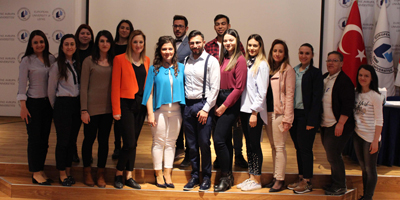“Current Physiotherapy and Rehabilitation Approaches in Lung Cancer Treatment” discussed at EUL

European University of Lefke Office of Students’ Dean and Physiotherapy and Rehabilitation Club organized a conference themed “Current Physiotherapy and Rehabilitation Approaches in Lung Cancer Treatment”. Academician of Hacettepe University Assoc. Prof. Dr. Naciye Vardar Yağlı attended the conference as a speaker.
Yağlı; Lung cancer is one of the most common cancer types.
Yağlı said that “Lung cancer is one of the most common cancer types and it is the leading cause of cancer-related deaths worldwide despite aggressive treatments” and added that with the increase in survival rates in cancer, there has also been an increase in the focus on side effects of cancer or cancer treatments. Yağlı listed the side effects of cancer treatments as; pain, cough, tiredness in the cases of surgery; nausea, infection, hair loss, loss of appetite, weight gain or loss in the cases of chemotherapy; nausea, vomiting, skin rash, symptoms of influenza in the cases of radiotherapy; and diarrhea, constipation, skin and hair changes in the cases of molecule-targeted therapy.
Yağlı; Targets for surgical patients in lung cancer are divided into four different stages according to the surgical timing
Pointing out that physiotherapy programs should be planed according to the phase of the disease and the needs of the patient, Yağlı said that targets for surgical patients in lung cancer are divided into four different stages according to the surgical timing and stated these stages as; Preoperative Period, Perioperative Period, Postoperative Period and Protection Period.
Describing the Preoperative Rehabilitation as the rehabilitation phase that includes exercises conducted before the surgery or treatment, Yağlı said that, “Preoperative exercise training improves pulmonary function before surgery and reduces the length of hospital stay and postoperative complications after lung cancer surgery and pulmonary resection surgery,”. Yağlı stated that studies on physiotherapy and rehabilitation methods applied patients who has lung cancer are generally focused on the perioperative turnover but there are deficiencies such as the absence of the control groups. Pointing out that in the postoperative period, after the discharge period; dyspnoea, fatigue, pain, pulmonary functions, and reduced quality of life are observed, Yağlı said that “In addition, adjuvant treatment following surgery in these patients also leads to a decrease in quality of life due to various side effects in the patients,”.
